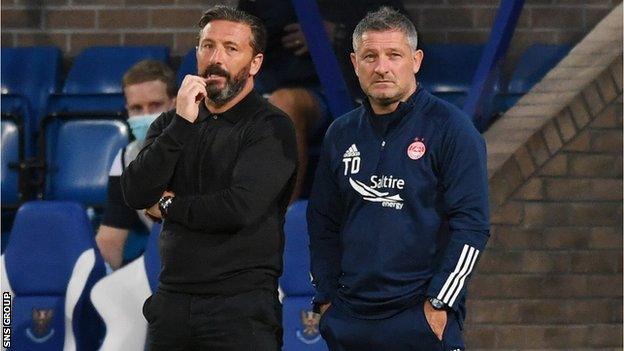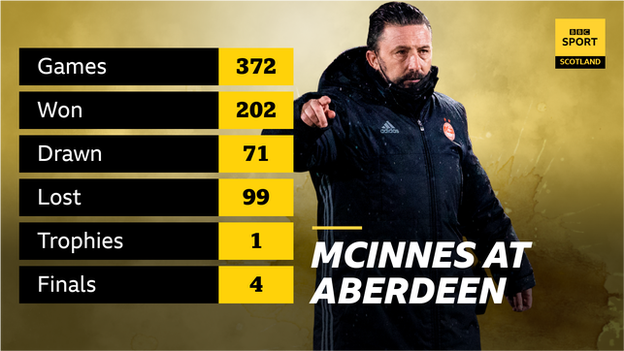Aberdeen: Derek McInnes at most 'dangerous point' of seven-year spell
- Published

Derek McInnes and assistant Tony Docherty are contracted to Aberdeen until summer 2022
After close to eight years and almost 400 games in charge, Derek McInnes has arrived at the most dangerous point of his time as manager of Aberdeen.
His reign started with a goalless draw at Easter Road in April 2013. It could end at Easter Road on Saturday if the Dons don't arrest their decline with a victory.
The mood music at the club is dark right now. McInnes, and his assistant Tony Docherty, will surely know what peril they are in. For a club with the third highest wage bill in the Scottish Premiership, the results have gone badly awry of late.
A sizeable majority of fans have been fed-up for some time with what they call the dourness of Aberdeen's football, the lack of creativity, ambition and goals.
Stayed too long?
Their view predates the current malaise, but one win in seven has done nothing to ease the tension between the fans and the club. The Dons have dropped to fourth place in the Premiership with Livingston, in fifth, eating up ground on them with every passing week. The hubbub at Celtic has dominated the headlines, but there's a lot going on at Aberdeen, too.
It's not just the supporters that McInnes needs to concern himself with now, though. This latest run appears to have brought the board to the brink. Or, at least, enough of the board.
It would take a seven-figure sum to compensate the manager and assistant manager if the worst materialises at Easter Road on Saturday but there is an acceptance at the top that either the situation improves now or a change needs to be made, however painful in a financial sense and in a human sense.
McInnes has done a fine job, but there is a growing feeling that he's just been there too long.
This is all a far cry from the early days of McInnes' time at Pittodrie, when previous chairman Stewart Milne brought him in and backed him to the hilt, with good results. McInnes took over a failing club and immediately turned things around.
In the four seasons before he was appointed manager, Aberdeen finished ninth on three occasions and then eighth with a win percentage that sunk to 25% at its lowest point and only rose to 36% at its highest.
Eighth place became third in his first full season, which became second in each of the four seasons that followed. In 2014, Aberdeen won the League Cup. Around that point, if not earlier, Milne started to look on McInnes as a man who was capable of walking on water. His successor, Dave Cormack, isn't quite as transfixed.
In February 2016, with Rangers and Hibs both still in the Championship, Aberdeen beat Ronny Deila's Celtic to move within three points of the league leaders with 14 games to go, but then fell away dreadfully, losing seven of those 14. A case of what-might-have-been that will live with all Dons fans from here until eternity.
Much of it was promising, though. Six straight cracks at European football, regular visits to Hampden for cup semi-finals and finals, the pick of them being the terrific 2017 Scottish Cup final when McInnes' team went toe-to-toe with Brendan Rodgers' invincibles and only lost to a late, late Tom Rogic winner.
That Aberdeen side was formidable, but it broke up soon enough. Graeme Shinnie, Ryan Jack, Kenny McLean and Jonny Hayes were all lured away and while Aberdeen finished a strong second once again in the season that followed, by dint of a first win at Celtic Park in 14 years, things deteriorated slowly after that.
Their business in the transfer market became borderline hapless. Reams of players have been signed in recent seasons and the success rate has been low. In 2018-19, Steve Clarke's Kilmarnock finished third with the Dons fourth, their win percentage across all competitions dropping from 64% to 55% and then to 50%.

Last season finished abruptly and Aberdeen were again fourth when the league was called. Their win percentage in all competitions was now 40%.
For a club trying to reinvent itself with a new training ground and plans for a new stadium, a club that prides itself on its interaction with its supporters, disaffected fans were not a good landscape and it's not got much better this season.
This latest bad run has brought old doubts back to the surface. The whole operation looks tired. After his first match in the job in 2013 McInnes said that he was looking for a "wee bit more craft, composure and guile" in his team.
What was said then could just as easily be said now. Eight years is an extraordinarily long period of time for any manager to stay in post. As one source put it: "We're just stale."
'Enormous' Easter Road clash awaits
There is a European dimension to all of this. With an improving coefficient next season offers more opportunities to Scottish clubs in Europe. It's not just about the Champions League and the Europa League any more, there's now a third competition in the shape of the Europa Conference League.
The Scottish Cup winners will now enter the Europa League in the final play-off round and if they fail to get through they will automatically drop into the Conference group stage, which will give them European football until Christmas.
It won't be rock 'n' roll opposition, but it will be lucrative enough. Aberdeen's own estimation is that the slot could be worth around £4m to whoever gets it.
If Aberdeen win the Scottish Cup then they're laughing on all fronts. If Celtic or Rangers win it - presuming it's played to a finish, which is not guaranteed - then that Europa League/Conference League spot goes to the team who finish third in the Premiership. Currently, that's Hibs, not Aberdeen, albeit Aberdeen would leapfrog them if they were to win their game in hand.
Finishing third has never been more important. That brings pressure. If Aberdeen produce the same points-per-game total in their final 12 games of the season as they've done in their first 26 games, then they're looking at 64 points. Influential people at Aberdeen have made these projections themselves.
Last season's incomplete season apart, 64 points would be the club's worst end-of-season total in the McInnes era. Scoring at their current rate, they'd end up with 45 goals. That, too, would be lowest number since he arrived.
The concern has now reached a compelling point. Saturday's trip to Easter Road is enormous.

Nothing is unplayable How disabled players are revolutionising gaming
Eating With My Ex: Can they settle the score and go again?

